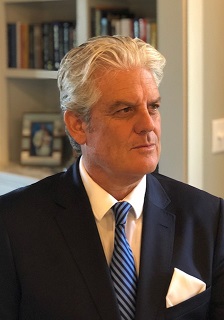From the CEO – February 2021

Dear Clients,
A good deal of the talk over the past month has centered on the risk of higher inflation and its impact on parts of the emerging market asset class. The basic idea is that rising US Treasury yields of late reflect looming inflation expectations, which at one level suggests the eventual end to cheap money.
For emerging markets, higher rates could pose a problem for those countries with considerable financing costs and large current account deficits. This is especially troubling as a report issued by Fitch’s earlier this year found that while the average interest rate on the entire stock of a sovereign’s debt has fallen to 2% from 4% over the past ten years in developed markets, for emerging markets the rate has increased to 5.1% from 4.3%. As a share of GDP and revenue, interest payments have doubled since 2021, with the numbers for Sub-Saharan Africa especially noticeable as the ratio of interest payments to revenue climbed to 12% from 5% during that period.
Adding to the worry are supply bottlenecks created by rising global demand, which have also pushed up energy and food prices. Oil (Brent and WTI crude) is up 20% since February and food prices are now at their highest level in six years. Russia and Argentina, as examples, have placed price controls on some staples and instituted tariffs on various exports in an effort to bring price pressures under control.
Oil and food are base effects, for sure, but they shouldn’t be ignored, since they can give rise to various political risks and a kind of feedback loop.
Inflation has been a key metric in our ICRG rating system (economic risk metrics) and we’ve consistently made it clear to our clients the linkages it has with other risk variables, from growth and debt levels, to various political risk factors, such as those affecting ‘internal conflict’ (e.g., civil disorder) and ‘socioeconomic conditions (e.gs., poverty, consumer confidence, unemployment). The last time we saw inflation numbers and commodity price movements of this sort was during the latter part of the 2000s. They channeled directly into the Arab Spring of early 2010.
But the obverse is also true: political risk affects inflation. In a very informative piece as part of the IMF’s Working Paper series, Aisen and Viega used a dataset covering 100 countries from 1960 to 1999 – and controlled for the countries’ economic structures and for the behavior of economic variables that may influence inflation – and found a government ‘crisis’ hikes the inflation rate by around 16%, whereas a messy cabinet change moves it higher by 9%. Economic freedom (e.gs., competitive job market, tax rates) has an important effect on inflation by reducing it significantly. (https://www.imf.org/external/pubs/ft/wp/2005/wp0549.pdf)
All of this underscores a kind of vicious circle, where inflation creates political risks, which in turn fuels inflation.
Turning to our ratings for the month, a number of countries are worth mentioning. In the Americas, Brazil’s Bolsonaro has some rather low approval ratings given the manner in which the COVID-19 pandemic is playing out. There have been calls for his impeachment and consumer confidence is dropping. Moreover, the recent firing of Petrobras’ CEO has led some to question whether Brasilia is about to intervene in the fuel market.
In Western Europe, a much brighter picture resides in Italy, where the new prime minister, Mario Draghi, enjoys high approval ratings and considerable partisan support. Business confidence is turning up and some lockdown measures are being lifted in key geographic areas.
The situation in Myanmar doesn’t appear to be getting better. Protests continue; reports of deaths are mounting. Public servants have joined ranks of the dissenters and the banking system has been grinding to a halt. There have also been reports of clashes between the protestors and those supportive of the military coup.
In Africa, Cote d’Ivoire holds a parliamentary election on March 6th, and all eyes are on which members of the varied opposition parties will be included in the new cabinet. And in the DRC, while a new prime minister has been appointed and Kabila seems to no longer exercise effective control over the legislative and judicial branches of government, the recent murder of Italy’s ambassador to the country and his aides underscores the dangers of that country’s rebel movement.
In Eastern Europe, protests in Belarus eased during the cold snap and as the state increases its security presence. Political risk remains “High” in the country despite some easing since October, 2029. Russia wants official language status for the NK region, which will likely fuel ethnic tensions in parts of Armenia, inter alia.
Finally, in the Middle East, sporadic protests in Egypt are decreasing in number and foreign exchange reserves continue their upward march. The government recently raised $3.75bn in a bond sale, and rising oil prices are helping fill the state’s coffers. Sudan devalued its currency as a precondition for debt relief as inflation is running at over 300%.
I was pleased to meet this month with Alix Shpekbayev and his associates from Kazakhstan’s Anti-Corruption Agency to discuss the country’s latest initiatives and results to eradicate graft. Along with some very interesting policies aimed at eliminating corruption at the operational levels of government, the Agency’s work to blend these efforts with larger goals of political and democratic reform were both pleasing and instructive. It’s always a pleasure to hear what Kazakhstan is doing on this score.
February was another stellar month for new and returning clients, ranging from some of the world’s top universities to the largest institutional investors throughout the US, Europe, the UK, and the Middle East and Asia. Several European central banks came into or returned to the PRS fold, as it were, along with the ‘central bank of central banks’ – the Bank for International Settlements – a longtime client. Thank you for your continued support!
Additionally, not only is ICRG being used by some of the world’s largest technology firms, but the data are now being incorporated increasingly into the artificial intelligence/machine learning space, with an emphasis on ESG data! On this score, we are especially pleased that our data are being used by an increasing number of institutional investors as the empirical connection between our select risk indicators and various asset classes becomes more pronounced and tradable. For decades, PRS’ reach has been global, offering the absolute best quant-driven and independently back-tested data available anywhere.
Quid Periculum? Measuring & Managing Political Risk in an Age of Uncertainty, co-edited and co-authored by Peter Marber (Harvard/Aperture Investors) and me, is set for release in March! The book includes such diverse topics as risk forecasting techniques, reliability measures, the impact of political risk on asset prices and sovereign debt workouts. Also featured is a special roundtable discussion by some of the world’s leading voices in the field on the future of political risk, who combine to address some of the challenges presented by globalization and COVID-19. For more information and to reserve a copy of the book, please contact Louis Carroll, PRS’ Director of Business Development, at lcarroll@prsgroup.com.
ICRG and related PRS data continue to be the gold standard of all geopolitical risk data among the scholarly and research communities. In a new IMF Working Paper, our ICRG data were used to account for political and macro-financial risk in terms of the following question: Can emerging markets influence their exposure to changing global financial conditions? Evidently, yes. As the study concludes: ‘Even though EM policy makers may not have the power to influence swings in global liquidity, they can still use conventional policy tools to counteract their exposure to help preserve domestic economic and financial stability.’ The findings offer significant implications for much of the investible EM asset class, especially in the COVID-19 world of enormous stimulus, inflation pressures, loose monetary policy the prospects of a weaker greenback. (https://lnkd.in/d3eCZe3)
Thanks for your continued support, and please contact us if we can be of any assistance.

Chief Executive






